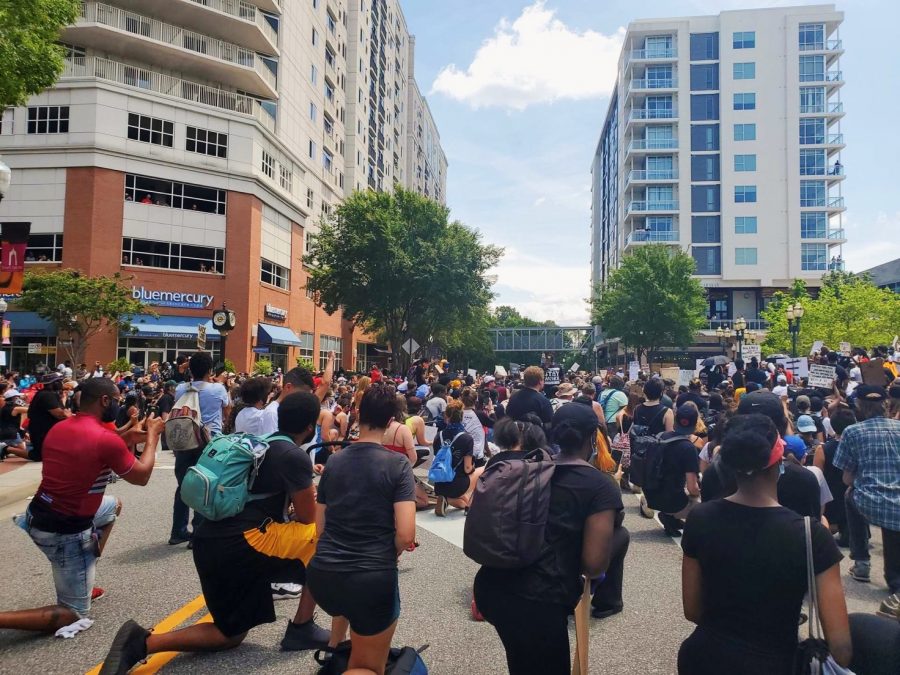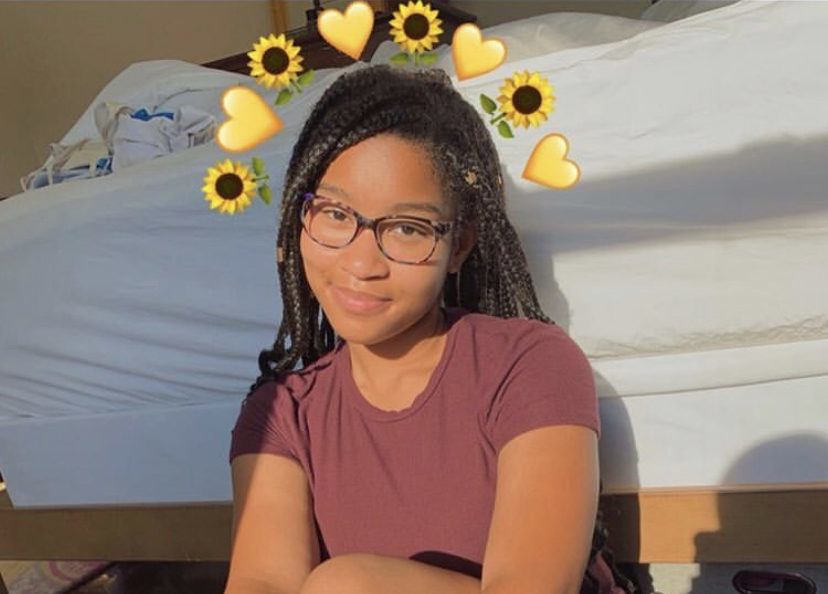Oppression continues to plague Black lives
Protestors kneel peacefully in rememberance of George Floyd at Town Center of Virginia Beach on June 6.
June 8, 2020
Despite a global pandemic, oppression still found a way to cross social distancing and reveal itself as a virus of ginormous proportions.
While many may believe that recent murders are shocking events, the deaths show evidence of a lingering disease to many.
If America is coined as the “freest country” yet still chooses to ignore a virus that kills with unjust murders, then the logic and communication in this country is flawed. No matter how many videos that show the extent of police brutality spread across social media platforms, systems have not been held accountable. How many generations will it take to see change?
“I am thankful that the entire world is finally waking up to the realities and fears black people face on a daily basis, but it’s sad that yet another precious black life had to be lost for this to be realized. Trayvon Martin, Eric Garner, Alton Sterling, Philando Castile, Sandra Bland, Tamir Rice, Ahmaud Arbery, Breonna Taylor, just to name a few, and now George Floyd. It’s infuriating and draining to see your people murdered for doing nothing while other races commit actual crimes and are gently taken into custody. America has a long way to go in the fight for justice, and until black lives are viewed, treated, and respected equally, “all lives matter” isn’t a true statement until black ones are included,” said senior Aliyah Webster.
While the media helps highlight the injustice, it can also be part of the problem. While the media may help to unlock the conversations that need to take place, it also builds stereotypes and generalizations, which creates rage and accusations rather than unifying dialogues.
“I feel like the media is spreading awareness and concern about the Black lives matter movement, but there are some people who fail to realize why we’re protesting,” said sophomore Andrea Penny.
A topic that floats in social media – but often left undiscussed – is “white privilege.” This term, originating in the 1980s, does not need to be offensive, and it does not mean white lives are not hard; to many people it just means that because of their white skin color, they are not seen as a threat to society. Sadly, many fail to recognize the reality of “white privilege,” but it often continues to benefit them and therefore increases the oppression of Black Americans.
“Social media has enabled me and many others to use our platform to spread information about protests, how to be a better ally, what we can do to help support the movement, and how to use our privileges to help other POC. Without social media, I don’t think the Black lives matter movement would be what it is today,” said junior Mitchell Francis.
Instead of silencing black voices, Americans should try to understand by being more proactive in the movement to end racism.
“Many people are unable to go out and protest, and spreading information through the media has a huge impact, seeing that the media is our generation’s main source of information,” said sophomore Miracle Harrison.
America will never be “great,” as many believe it is, if it only benefits some and fails to help others. Those who respond with “all lives matter” to “Black lives matter” communicate an unwillingness to listen. It can show a power struggle that needs to be dismantled if Americans want progress. Equal rights for blacks does not mean fewer rights for whites.
“It’s important to post about these issues, so people can understand what’s going on and how to help,” said Miracle.
Scouring media for events and initiatives may help, but education is key in order to unpack the narrative that has followed black lives for over 400 years. It is important to risk the discomfort of conversation and open up dialogue to create understanding. Find the millions of conversations or dollars it may take to find a cure, just like America has done for COVID-19. Check out websites and resources that create larger perspectives.
“Please I can’t breathe. My stomach hurts. My neck hurts. Everything hurts. They’re going to kill me,” said George Floyd, a black man aged 46 who was murdered by ex-police officer Derek Chauvin on May 25, 2020. He wept for his mother and begged to be allowed to stand while being unarmed and handcuffed on the ground, but he was not heard.
According to ABC News, this treatment led to his death. These actions by the officer caused asphyxia from neck and back compression and led to a lack of blood flow to the brain. Despite the begging, the officer steadily held his knee down on his neck performing a restraint technique, which is not a part of the department’s training. In fact, this officer had 12 complaints of police brutality already filed against him in the Minneapolis office but were listed as “closed,” “non-public,” or “no discipline.”
This kind of silence, or “covering up,” only adds to the problems at hand and creates an impression that one agrees and accepts injustice. People must start talking and not just on social media. On the job, speak up for inequities. Racism will not get better if people have one-sided narratives and talk only in private. Protests may be a start, but real communication begins when people start listening to each other.
“I feel like the Black lives matter movement should be heard. The peaceful protesting is the way to go. I don’t agree with the riots and looting. It says more about your character than your words. I understand that Floyd was killed senselessly, but burning targets and looting doesn’t justify an innocent African American’s death,” said sophomore Kevin Johnson.
On May 27, 2020, peaceful protests were held in Minneapolis, MN, and were met with tear gas, stun grenades, rubber bullets, and heavily armed police presence. A few weeks prior, Coronavirus deniers and MAGA supporters brought AR-15s inside state capitols and were left alone. These men had confederate flags that represent an unpatriotic time in American history. This is not a freedom of speech situation as some want to influence others to believe; this is showing hatred to America and what it should stand for.
This is not a white vs. black issue; this is a people vs. racism issue. People should demand justice for Americans, regardless of their skin color. Use a voice to educate people on their privilege and call out government leaders. Help a system that is flawed. It should not take videos and social media to understand the pain many face on a daily basis. Get out there personally and get involved in community initiatives that seek to educate. Hashtags are not enough.
Sign the petitions: blacklivesmatter.carrd.co
Donate to: https://www.gofundme.com/f/georgefloyd and Minnesotafreedomfund.org



Amanti Walker • Jun 10, 2020 at 5:04 pm
Hi Kalorra, just wanna say that this article you wrote is well-written and very informative. I like how you stayed on topic consistently and provided details that further backed up your topic. I even like how you included quotes from others to get different perspectives seen. Normally when I read articles I start to not pay attention after some time but this was interesting enough to keep me focused throughout the entire thing, I actually expected more to read when I got to the last paragraph. It would’ve taken me weeks to type something this good, keep writing more inspiring pieces like this :).
Portia Melvin • Jun 9, 2020 at 5:38 pm
Baby you said a mouth full of the truth… I love you my sweet niece
Azaria Reed • Jun 9, 2020 at 2:41 pm
Wow… you would think a 35 year old activist wrote this article. I love how you included multiple high school students and you even put information to help at the bottom of the article. “Those who respond with “all lives matter” to “Black lives matter” communicate an unwillingness to listen. It can show a power struggle that needs to be dismantled if Americans want progress. Equal rights for blacks does not mean fewer rights for whites.” That quote right there Love how you explained it.